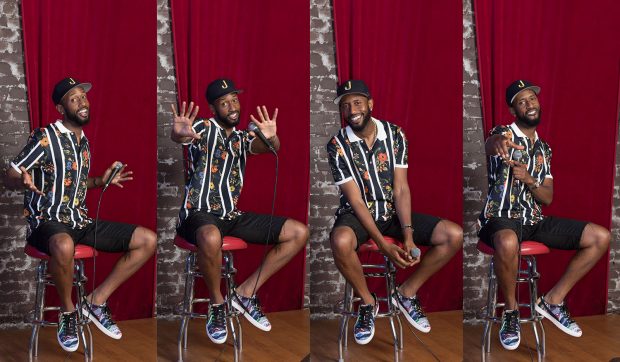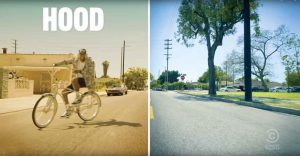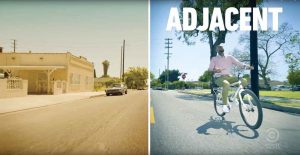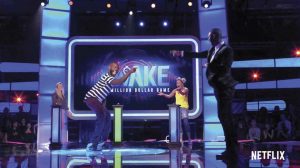
Photos By David Zaitz
JAMES DAVIS HAS been sitting at our table at Roscoe’s Chicken and Waffles in L.A. for no more than five minutes when his phone lights up with a call. He hasn’t even had time to order yet, and already, his attention is being diverted in another direction.
It’s a girl. Davis answers and tells her playfully: “I’m mid-interview, but I was, like, ‘I have to pick this up.’”
If she’s not used to hearing it from him yet, she will be soon: Davis’s work as a comedian, actor and writer is more in demand than ever these days. Since leaving Pomona to pursue a career in entertainment, Davis has appeared on shows like Kevin Hart’s Real Husbands of Hollywood, created and starred in Hood Adjacent with James Davis, which aired on Comedy Central for a season in 2017, and, most recently, acted as the host for a game show called Awake: The Million Dollar Game, which premiered on Netflix in June. He’s got 50,000 Instagram followers and a newly released stand-up special. He’s not all the way on top of the world yet, but he is definitely making a rapid ascent.
Davis is balanced on a precipice: He’s already achieved what many people would consider a lifetime’s worth of career milestones; on the other hand, he’s only 32, and he has “very big” goals he’s still aiming to achieve, he says.
On the day we meet, however, he’s just back from a weekend trip to Las Vegas for a friend’s birthday, where he learned he loves to gamble (“like, too much”). So for the moment, he’s less comedy superstar in the making, and more relatable hungover 30-something. For today, his goals are a little smaller: He wants to reassure his girl he’s still into her, eat some fried chicken, and then take a well-deserved nap.
Despite the fact that he didn’t end up graduating, Davis says that he loved his time at Pomona. He enrolled expecting to become a lawyer, but instead, he got distracted by studying English and taking acting classes. He liked the acting part so much that he started doing some work as an extra in L.A., and that was it for him, he says: “I was like, ‘This is what I want to do.’”
“I chose the school; I chose my major,” he continues. “But that bug, when it hits you, it really hits you. And when that passion is so strong, everything else really starts to feel like a distraction.”
He quickly discovered that passion would only take him so far: “That was way more daunting than I’d assume it was going to be, coming from the Pomona bubble,” Davis says now, laughing at his youthful hubris. “Like, Hollywood. I’ll conquer that next!”
 Luckily he’d grown up in L.A., so Davis had a place to crash while he was making a name for himself: His mom took him in while he went to auditions and started pulling together material for a stand-up routine. He doesn’t take that for granted, he says: “I didn’t have to sleep on any couches. I didn’t have that desperation with my comedy where I was like, ‘If this joke doesn’t land, or I don’t book this one gig, I’ll have to fly back home.’” Davis looks around the restaurant, which has been a touchstone in his life since he and his friends hung out here on weekend nights in high school, and smiles. “I’m already back home.”
Luckily he’d grown up in L.A., so Davis had a place to crash while he was making a name for himself: His mom took him in while he went to auditions and started pulling together material for a stand-up routine. He doesn’t take that for granted, he says: “I didn’t have to sleep on any couches. I didn’t have that desperation with my comedy where I was like, ‘If this joke doesn’t land, or I don’t book this one gig, I’ll have to fly back home.’” Davis looks around the restaurant, which has been a touchstone in his life since he and his friends hung out here on weekend nights in high school, and smiles. “I’m already back home.”
Still, the climb from being a nameless nobody to the top-billed star of a Comedy Central show was a grind. Davis started out at the very bottom, doing what he describes as “bring a room” shows, which anyone can perform at as long as they have a friend who’s willing to accompany them (and buy a couple of drinks). From there, he befriended other comedians and persuaded them to watch his tapes; they, in turn, spoke to Ens Mitchell, who owns a mid-city LA club called The Comedy Union, on his behalf.
 The Comedy Union was the perfect place for Davis to hone his craft, he says, in part because it tends to draw racially diverse audiences. Davis grew up toggling between black and white spaces: he was born and raised in Baldwin Hills, a historically black neighborhood, but as a teenager he would travel crosstown to Santa Monica to attend a majority-white private school, Crossroads School for Arts & Sciences.
The Comedy Union was the perfect place for Davis to hone his craft, he says, in part because it tends to draw racially diverse audiences. Davis grew up toggling between black and white spaces: he was born and raised in Baldwin Hills, a historically black neighborhood, but as a teenager he would travel crosstown to Santa Monica to attend a majority-white private school, Crossroads School for Arts & Sciences.
So The Comedy Union immediately felt like home because “it’s predominantly black, but not all black. For someone who’s self-proclaimed hood-adjacent, it was important for me to have jokes that appealed to everybody. I didn’t just want to do rooms that were all black, and I didn’t want to be the comedian that only does all-white rooms either. When my friends come to the show, I want them to laugh, both white and non-white,” Davis says.
Davis credits his education with helping him craft the kinds of jokes that caught Mitchell’s eye and made him popular with those diverse audiences. “Those classes,” he says, talking about the time he spent in college, “are what I think make my jokes different from the majority of my peers’. Those classes are what gave me a certain awareness about the world, to then use comedy as a platform.”
When Davis is writing a joke, he says, he’s not just trying to be funny (though he acknowledges that getting a laugh is a critical part of his job description). “I’m writing with multiple motivations,” he says. “I want it to catch you off guard, shock you a little bit. Under all of my jokes I feel like there is a message, some kind of actual statement.”
Davis sees himself as an activist for “my own causes, whatever I feel is important to me.” These concerns range from jokes about the absurdity of the NCAA’s rules about compensating student athletes to taking on police violence in black communities. One of his favorite bits from his stand-up routine, he says, is about the murder of one of his uncles by a police officer. There’s a joke in there, a standard laugh line: Davis riffing on how he never got to know what kind of uncle stereotype his uncle would have inhabited—the cheap one, the drunk one, etc.
But also, “I’m using this moment to say, ‘Hey, me too,’” Davis explains. “This person performing for you—I am one of those people who’s had a family member killed by a police officer. So if you think you’ve never seen somebody who’s been affected by this—here’s someone who has.”
He cites studying with ex–Black Panther Phyllis Jackson while at Pomona as an experience that helped him realize how important it was to share his perspective. “You realize that the rest of the world didn’t take this class; the rest of the world doesn’t see that particular point of view,” Davis says. “People say that I’m a smart comedian, that I’m clever. To me, I’m a product of the education I’ve been put in.”
He also recognizes that he’s lucky to have an audience to share with. “Not everybody is blessed with the opportunity to walk on a stage and be guaranteed a listening audience even for a split second,” he says. “I feel called to, in some way, use that platform for more than just self-gain.”
But putting so much into his comedy can be emotionally draining, and some days he’s not really in the mood to give his experiences a punch line. “I care about a lot of serious issues, but I’m a comedian,” Davis says. “I’m going through a lot of serious things in my personal life right now, but I’m a comedian. Right now, comedy is a little more challenging.” He pauses and considers. He also writes and acts; he could focus on those pursuits instead, and to some extent, he’s doing so. But he can’t bring himself to give up on comedy, because, he says, when he’s doing it well, it feels better than anything else on Earth.
When Davis first got into comedy, having his own show was the dream. “I remember watching Chapelle’s Show and being like, ‘This is what I want to do,’” he says. He was so focused on getting there that he regularly turned down gigs guest-starring in other people’s projects, which “would make people look at me weird, like I’m crazy.”
But his focus paid off: Hood Adjacent premiered on Comedy Central in June 2017. The show is formally similar to Chappelle’s: It features Davis doing stand-up bits for a live audience before introducing prerecorded segments where he does things like gather a bunch of minority students from a local college campus to interview them about what it’s like to be the token in their friend groups, or takes his bougiest friends to try to earn their “hood passes” from a Compton native.
The show is extremely personal, and extremely specific to Davis: It’s his attempt to translate to a larger audience his experiences of blackness, of growing up in Los Angeles, of simultaneously belonging and not belonging in various communities. It was thrilling to get it made, but also “so stressful,” Davis says. At the time, it was hard to appreciate the full extent of what he’d accomplished, and even now, “I’ll sit back and realize, ‘I did it,’” he says, shaking his head, still amazed.
To be fair, he didn’t have very long to get used to the idea: Hood Adajcent lasted just eight episodes. “It didn’t stay on like Chapelle’s Show,” Davis says. So, on to the next one: “Then I was like, ‘I gotta create another show.’”
 That next show is still gestating; in the meantime, he has to earn a living, which is how he ended up on a Burbank backlot shooting Awake, a show that feels like a hard left turn for a comedian whose work is usually fairly personal and political. There’s no discussion of the nuances of the black American experience on Awake; instead, Davis is responsible for shepherding a group of contestants through a series of goofy challenges made harder by the fact that they haven’t slept in 24 hours: They chug Slushies, thread needles, and turn off alarm clocks with bleary, sometimes daffy determination.
That next show is still gestating; in the meantime, he has to earn a living, which is how he ended up on a Burbank backlot shooting Awake, a show that feels like a hard left turn for a comedian whose work is usually fairly personal and political. There’s no discussion of the nuances of the black American experience on Awake; instead, Davis is responsible for shepherding a group of contestants through a series of goofy challenges made harder by the fact that they haven’t slept in 24 hours: They chug Slushies, thread needles, and turn off alarm clocks with bleary, sometimes daffy determination.
Davis recalls a Netflix executive calling to offer him the job and asking, essentially, Are you all in on this? Is this show the biggest thing in your life right now?
“I remember saying, ‘Listen, when I left college, it was not to be a game show host,’” Davis reports, laughing. “‘But I think this is gonna be a great show. I love the premise. I’m gonna take it seriously and do my best.’”
He saw Awake as an opportunity, and he’s been in Hollywood long enough to know that you should never turn down one of those. “Unless you’re a superstar, and you have that skyrocketing trajectory of a career, every appearance moves you a little bit closer, gives you more eyes,” he says. “Hood Adjacent opened up a lot of people to me. I did a Facebook game show with charities, and that helped me get Awake. Awake is going to open me up to more hosting opportunities. Which is not what I was trying to do, but if that’s what I do in between my passion projects, that’s super cool with me.”
Davis is at an interesting juncture in his career, and his life. He’s successful enough that friends are starting to ask him for favors. (He tells them, “Appearances versus payment are very different. I’m not Tom Cruise; I’m not Will Smith. I’m not anything close to that. I can get a couple of bills—like, dinner bills.”). And Twitter haters are popping up regularly. (“If they’re tweeting at you, they know about you. I remember when I had no haters because no one knew of me. There’s just too many people on the Internet to worry about whether it’s all positive.”) But he also still feels like he has a lot left that he wants to accomplish—getting another show of his own being just one of them.
“I shot a pilot for TruTV; TruTV went through some internal issues and didn’t pick up a bunch of pilots, including mine,” he says. “But I feel really good about what we shot, so I feel like it’s going to land somewhere. I feel like there’s going to be me hosting some other stuff—I’ve had a couple of meetings and some tests.”
“Right now,” he continues, “I’m really an open slate; it’s about what I choose to do. I know for a fact that I’m going to be doing short films, maybe put some stuff in some festivals. Just elevating, and continuing to use whatever craft to speak my mind.”
He’s particularly excited about doing more writing in every format: “Writing is always my favorite, because writing is at the base of everything,” Davis says. “My favorite part is receiving a blessing of an idea, and then just capturing it and executing it, no matter what the genre is.”
And maybe he’ll help some of those friends get ahead too: His rise has given him the opportunity to open doors for old pals, a position he says he both relishes and resents. It comes with a lot of pressure: “I’ve got friends who, the plan was always, I get on, and I help them get on,” he says. Which means he has to succeed for their sake as well as for his own: “If I can’t get on, I can’t help them get on.”
Davis feels the weight of his community on his shoulders, as well as his own high expectations for himself. But most days, the challenge excites him.
“I embraced that I’m the star of the team,” he says. “I’m Kobe. Comes with the territory. Heavy lies the crown, but I still like how the crown fits.” He tilts his head back and forth and smiles knowingly. “Even though it’s heavy and it hurts, I like how it looks on me.”
